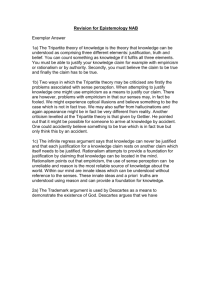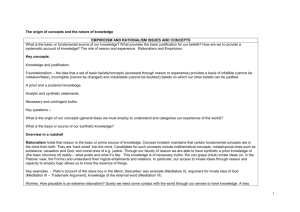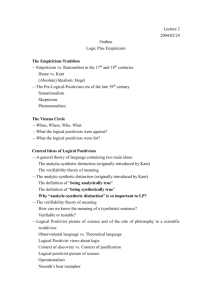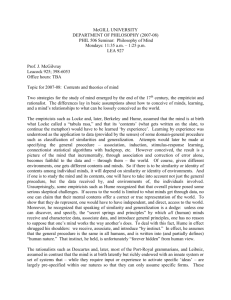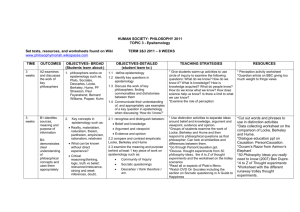David Norton on empiricism
advertisement
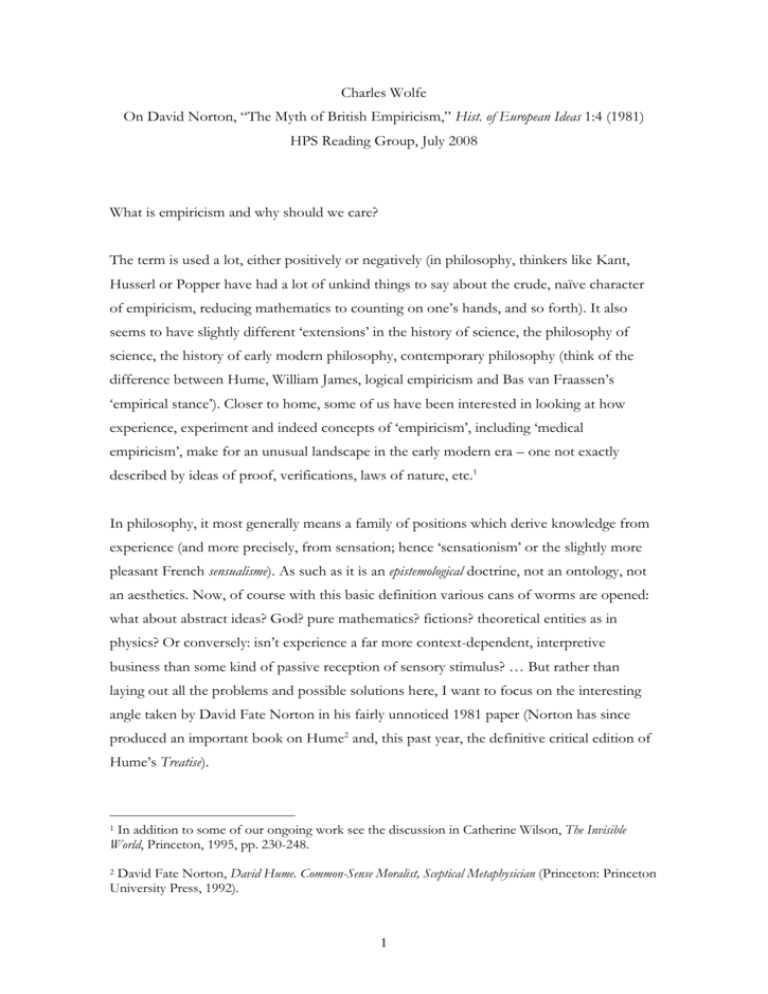
Charles Wolfe On David Norton, “The Myth of British Empiricism,” Hist. of European Ideas 1:4 (1981) HPS Reading Group, July 2008 What is empiricism and why should we care? The term is used a lot, either positively or negatively (in philosophy, thinkers like Kant, Husserl or Popper have had a lot of unkind things to say about the crude, naïve character of empiricism, reducing mathematics to counting on one’s hands, and so forth). It also seems to have slightly different ‘extensions’ in the history of science, the philosophy of science, the history of early modern philosophy, contemporary philosophy (think of the difference between Hume, William James, logical empiricism and Bas van Fraassen’s ‘empirical stance’). Closer to home, some of us have been interested in looking at how experience, experiment and indeed concepts of ‘empiricism’, including ‘medical empiricism’, make for an unusual landscape in the early modern era – one not exactly described by ideas of proof, verifications, laws of nature, etc.1 In philosophy, it most generally means a family of positions which derive knowledge from experience (and more precisely, from sensation; hence ‘sensationism’ or the slightly more pleasant French sensualisme). As such as it is an epistemological doctrine, not an ontology, not an aesthetics. Now, of course with this basic definition various cans of worms are opened: what about abstract ideas? God? pure mathematics? fictions? theoretical entities as in physics? Or conversely: isn’t experience a far more context-dependent, interpretive business than some kind of passive reception of sensory stimulus? … But rather than laying out all the problems and possible solutions here, I want to focus on the interesting angle taken by David Fate Norton in his fairly unnoticed 1981 paper (Norton has since produced an important book on Hume2 and, this past year, the definitive critical edition of Hume’s Treatise). In addition to some of our ongoing work see the discussion in Catherine Wilson, The Invisible World, Princeton, 1995, pp. 230-248. 1 David Fate Norton, David Hume. Common-Sense Moralist, Sceptical Metaphysician (Princeton: Princeton University Press, 1992). 2 1 It so happens that among the basic facts about empiricism, in the history of modern philosophy, is its supposed opposition to ‘rationalism’. These terms were not in use in the period (an ‘empirick’ was something very different), but emerged in the 19th century, chiefly in the wake of Kant, the “sage of Königsberg” of whom Norton speaks. Kant tried to broker clever compromises between the empiricists (chiefly Hume) and the rationalists (chiefly Leibniz, to whom he seems closer than Descartes or Spinoza). Roughly, empiricists were British, and rationalists were Continental (always suspect3). In terms of content, empiricists held that knowledge came from experience, whereas rationalists held that knowledge was somehow innate or a priori, and that the basic structure of the mind somehow matched or was identical to the basic structure of the world (but Descartes, Spinoza, Leibniz and later Hegel – and earlier Aquinas – all have very different versions of this view).4 Norton is among the first, indeed, perhaps the first person to openly challenge the pertinence of this opposition between empiricism and rationalism as a valid historical classification. (No one is denying that Locke pokes a lot of fun at Descartes or that Leibniz is quite severe in his critique of Locke; but this doesn’t make Russell’s History of Western Philosophy any more reliable as a guide to these authors!) Since then, Louis Loeb, Michael Ayers, Stephen Gaukroger and Knud Haakonssen have taken various stabs at it. (I note that the problem of ‘empiricism vs. rationalism’ may not seem enormously relevant or helpful in understanding Scientific Revolution figures, but in fact, if we look at someone like Boyle, for whom “There is a big difference betwixt the being able to make Experiments, and the being able to give a Philosophical Account of them,”5 and Locke’s closeness to Boyle, the issue starts to emerge there as well.6) Churchill, when asked the potentially damaging question, if he believed in God, replied “what a Continental question !”. 3 I am most familiar with the Kantian source of the problem; Norton also describes its genesis in Thomas Reid (with Reid’s argument that there is a “Way of Ideas” leading from Descartes to Locke, Berkeley and Hume, and culminating in scepticism. Reid and Kant are both theorists of this ‘narrative’ and consequently critics of it, in parallel. 4 5 Boyle, Sceptical Chymist, in Works, eds. Hunter & Davis, vol. 2, Pickering & Chatto, p. 221. Peter Alexander, a major (philosophical) specialist of Boyle and Locke, presented a paper on Locke at a conference in Paris in 2004 entitled “How could a respectable seventeenth-century empiricist be influenced by Robert Boyle?” 6 2 One key issue, first discussed by Norton on p. 332, is the idea that ‘Locke begat Berkeley, who begat Hume’. It turns out that Locke read a lot of Malebranche (and Gassendi, or at least Bernier’s major 6-volume digest of Gassendi) and translated three of Pierre Nicole’s Essais de morale; and Hume read a lot of Bayle (and Malebranche). It also turns out that the main thinker who really defended the credo ‘nihil est in intellectu quod non fuerit in sensu’, ‘nothing in the intellect which was not first in the senses’7 – the closest there is to a slogan of empiricism – was Gassendi, not a British thinker since he was from the South of France (Digne, in the Provence Alps). What of the theory of the passions (Spinoza and Hume)? Or naturalistic accounts of mind (which are more outgrowths of Malebranchian causal reasoning than of anything empiricist), or the Cambridge Platonists? An additional feature which is missed in the ‘British Empiricism versus Continental Rationalism’ opposition, is the existence of what we now call the Scottish Enlightenment, which instead of LockeBerkeley-Hume produces, e.g. the trio ‘Hutcheson-Hume-Smith’, and within which the whole project of a science of human nature, what later will be called social science, really emerges (with the figure of Hume the historian).8 A key problem is the development of epistemology as a ‘genre’ and the retroactive vision we can have, thinking that various thinkers had a self-contained, deliberately conceived epistemology (hence there is a Platonic epistemology, a Cartesian epistemology, a Lockean epistemology, etc.). In fact this is very much a later invention, both due to post-Kantian (particularly neo-Kantian) thinkers and to Reid; and if we look, e.g. at Locke, his ‘epistemology’ is much more motivated by political and ethical concerns (just as Hume’s epistemology might be instead a dialogue with skepticism).9 Norton runs through various pros and cons of the notion of ‘British empiricism’. I would just like to point to the claim, first made on p. 334 and reiterated at greater length on p. Or, in Hobbes’ version, “nihil esse in intellectu humano, quod non prius fuerit in sensu” (“there is nothing in human intellect that was not previously in sense (for sensation takes place through the action of objects even […] upon the sensoria or the organs of perception”); Hobbes, Thomas White’s ‘De Mundo’ Examined, trans. H.W. Jones (London: Bradford University Press, 1976), ch. XXX, § 3, p. 364. 7 An additional point here, which has been explored recently by Manfred Kuehn, Ian Hunter and others, is the intellectual proximity between the Scottish and German Enlightenments. 8 On these issues see also Kenneth Winkler, “Empiricism,” in J. Kim and E. Sosa, eds., A Companion to Metaphysics (Blackwell, 1995), pp. 128-134. 9 3 340, that the thinkers we call empiricists (a) were less empirically minded than their 16th and 17th-century forebears, and (b) were in fact critical of empiricism, at least in the case of Hume. — This connects in my view to the issue we will be discussing in next year’s ‘Embodied Empiricism’ conference, of how there might at the very least be different kinds of empiricism operative in English thought in this period; I suggest, for the sake of discussion, the following distinction: — a ‘Royal Society’, experimentalist empiricism (Bacon, Boyle…); — a medically motivated, ‘embodied’ empiricism (Harvey, Gassendi, Sydenham; La Mettrie in a way) — a moral/practical empiricism (Locke and Hume). Notice that with the above list of kinds of empiricism I am not following Norton in saying (as he does in the last paragraph), let’s give up the term altogether. But it helps to make distinctions – even in the restricted context of, say, the period 1650-1750. (What John Stuart Mill, William James, John Dewey or A.J. Ayer end up meaning by ‘empiricism’ essentially multiplies the problem again.10) In addition, one can complicate these distinctions by pointing out, e.g., that Bacon’s formalized inductivism is derived from the practices of the craftsmen and tradesmen (Christopher Hill), or conversely, that early modern science only produces epistemologies as a justificatory measure. Does Norton’s careful research and reconstruction of the issue shed any light, or make a difference, to other early-modern concerns? Criticisms: — I am a bit confused by the passage, p. 337, about the distinction between primary and secondary qualities. As far as I can tell, this is a distinction which really does span the Channel, since it is first formulated by Galileo, reiterated by Descartes, then reconstructed and rendered more complex by Boyle as a scientific claim, and lastly further ‘complexified’ on philosophical grounds by Locke. And the main objection to it that I am aware of is … Mill’s empiricism is mainly stated in his Examination of Sir William Hamilton’s Philosophy, e.g. chs. 11-12. It’s really Mill who takes Humean inductivism and turns it into the atomistic vision of experience as an aggregate of ‘facts’ (sensory percepts). He also says that numbers are the property of physical objects (the position criticized by Frege). By Dewey see the under-studied article “An Empirical survey of empiricisms” (Later Works, vol. 11, Southern Illinois University Press). 10 4 Hume’s, in an odd section of the Treatise entitled ‘Of the Modern Philosophy’ (T I.iv.4), where he basically claims the distinction between primary qualities as features of the physical world and secondary qualities as features of the experienced, human or subjective world, is factitious. — Norton’s claims about Hume as in fact a friend to metaphysics seem spurious. — He (Norton) can himself be criticized for having too epistemological a view, e.g. of Gassendi. 5
